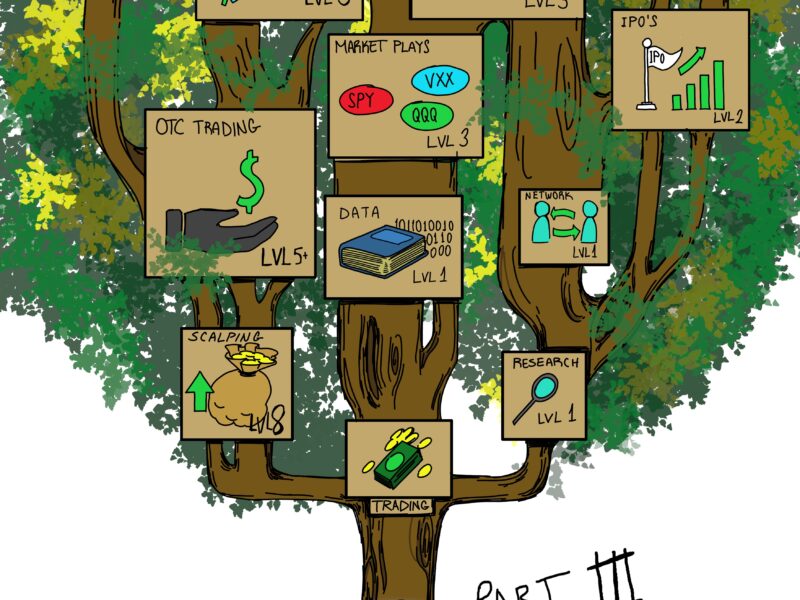You have to pay for your own trip?
That’s what my dad asked me when I told him about MBC Securites inviting me out to New York. He thought presitigious tier-1 financial firms would cover your expenses if they wanted you out for an in-person visit. I think he had an inkling that this firm he hadn’t heard of wasn’t quite on the level of Goldman Sachs…
Personally, I had no delusion that MBC was a blue blood trading firm that would attract elite candidates like a Jane Street or a Susquehanna. It was bit more of a rogue outfit, which was cool in an anti-establishment kind of way. I always fancied myself a bit of a secret rebel. I didn’t want to wear a suit and tie and be told what to do. I didn’t want to fetch anyone coffee. I didn’t want to preen and politik to get ahead, I just wanted my work to speak for itself. I sat through finance club meetings with guest speakers who spent decades working in those firms doing all those traditional things–IB, private equity, fixed income, equity research, wealth management–that was never going to be my path. TGP’s author had described MBC’s business model as “eat what you kill”, meaning a trader only gets paid if he takes money out of the market. No profits, no food on the table.

It was purely a performance based job. And that comes with a certain autonomy. That was fine with me but I purposely ommitted these things when telling my parents. I didn’t want them to think I was potentially moving 3000 miles away just for some pointless internship scam. Nonetheless they paid for my trip and said have fun.
So I make the trip out. It’s just me out there for a weekend, my first visit to the hell hole that is New York City. My first impressions… it’s really cold and there are a lot more people on the street than I ever witnessed in my entire life. As a guy with serious social anxiety at the time, it was oddly comforting to feel completely anonymous around such a large amount of people. A friend told me to get Artichoke’s Pizza and play pool at Fat Cat (now known as Cellar Dog) out in West Village. So I did those things to pass the time. But my anticipation was mostly set on my visit to MBC Securities.
I was invited to a big trading floor out in the Financial District, out where a firm could credibly label themselves a “Wall Street firm”, just from their proximity to the NYSE. The entire floor belonged to a larger umbrella broker-dealer that housed many other different prop firms. I’d walk through the hallway, peer through the glass doors and see rows of four-monitor trading setups all crammed together on a long dark trading desk; the signs on the main doors had names like “Bear Capital”, “A3 Partners”, “Eastern Tech Trading”, and finally at the end of the hall: MBC Securities.
I was led to a room with a couple other undergraduates who were also applying to the MBC desk. A guy introduced himself as the floor manager and told us there was a meeting being held in the main room with all of the junior traders, with everyone doing a presentation of a specific trade. We were asked to collorborate on a trade presentation and given a stock–LVS (Las Vegas Sands). Just for context, LVS from 2007 to 2010 was a pretty volatile and highly “watched” stock. Casinos in general had a lot of volatility due to the uncertainty around how massively-levered Vegas would recover from the Great Financial Crisis. But in the last ten years, that industry became relatively boring. I don’t think I’ve traded LVS even once in a decade. But anyway… looking back, this was basically an exercise in bullshitting. We didn’t know shit about shit at the time. It was just a matter of how much technical jargon we could throw into a presentation, slap it all together, and talk a good game about it. The me who existed at the time didn’t see it that way, I was earnestly trying to make a good presentation and impress everyone so I could immediately be seen as “one of the team”.
I remember the process we went through during our little 10 minute prep session… “ok this is a good price level because this price point was breeched but then it abruptly recovered in 2007… and again this happened in 2009. So let’s just draw a horizontal line because it is an important support level”. Does that shit even work? Up to you to decide that. Then we said that if that long-term price level was breeched on the open, it would signal a breakout and we would start buying, with a 1 point stop loss. Some bullshit like that. I lead the presentation and I did about 75% of the talking. It was a nervy experience but there was a voice inside me saying “I know I belong, in fact I’m probably going to better than all these guys, why not speak with confidence and act like I know what I’m doing?”
Victor, the author of TGP and a managing partner of MBC, was watching in the back and critiquing everyone’s presentation after they finished. He was harder on some traders more than others–he would often raise his voice to make his point and it seemed kind of arbitary when he would do it. He’d yell things like “that doesn’t make sense at all!” and it’s just about some poor schmoe’s pitchfork trend lines. Honestly, it’s just technical analysis… either none of it makes sense or it all makes sense. He raised some minor issues with my trade, thinking I was “too late” in my trade entry. He said he would’ve been in earlier for… reasons. But other than that, not a whole lot, so I think I held my own.
At the end of this team meeting, the traders left and it was just us, the undergraduates, and Victor. We were set to do our last round of interviews with him before finalizing a position on the trading desk that would start in the summer. One guy, Billy, had his interview and then came back. Victor had a phone call so we had to wait. There was some time for Billy to tell us how it went.
“Victor said I have to put up $5,000. He said I get a half scholarship.” He went to say that the “sticker price” was $10,000 per student each training class but the best students would get scholarships and not have to pay it entirely. Victor had told Billy he liked his credentials so he would give him half off the “tuition”.
Scholarship? Tuition? Why does Billy have to put up money? I knew this was a business model where you eat what you kill, I get that. And I knew MBC sold some trading products to retail as a side business. But the people they actually hire to trade on their desk would have to put up capital? That was NOT something mentioned in TGP and I didn’t like it. I had read on forums like Wall Street Oasis that lower-tier trading firms would ask their traders to put up initial capital rather than fully back them. They might even label the starting capital as an “education fee” to make it seem like the trader wasn’t funding an account but paying for the training. Here, they’re using terms like scholarship and tuition.
A few minutes later, Victor came back and motioned me to his office for the interview. He didn’t ask me anything other than just… Do you have any questions for me?
Me: Do I have to put up any money?
Victor: No. Not you, you get a full scholarship.
Well… as long as I’m not the one who has to put up a deposit, I guess I’m okay with it. This is my chance to be a professional trader in the financial capital of the world, am I really going to blow it up now?
I told Victor I’ll see him in the summer.
(continued in: Training Program)



